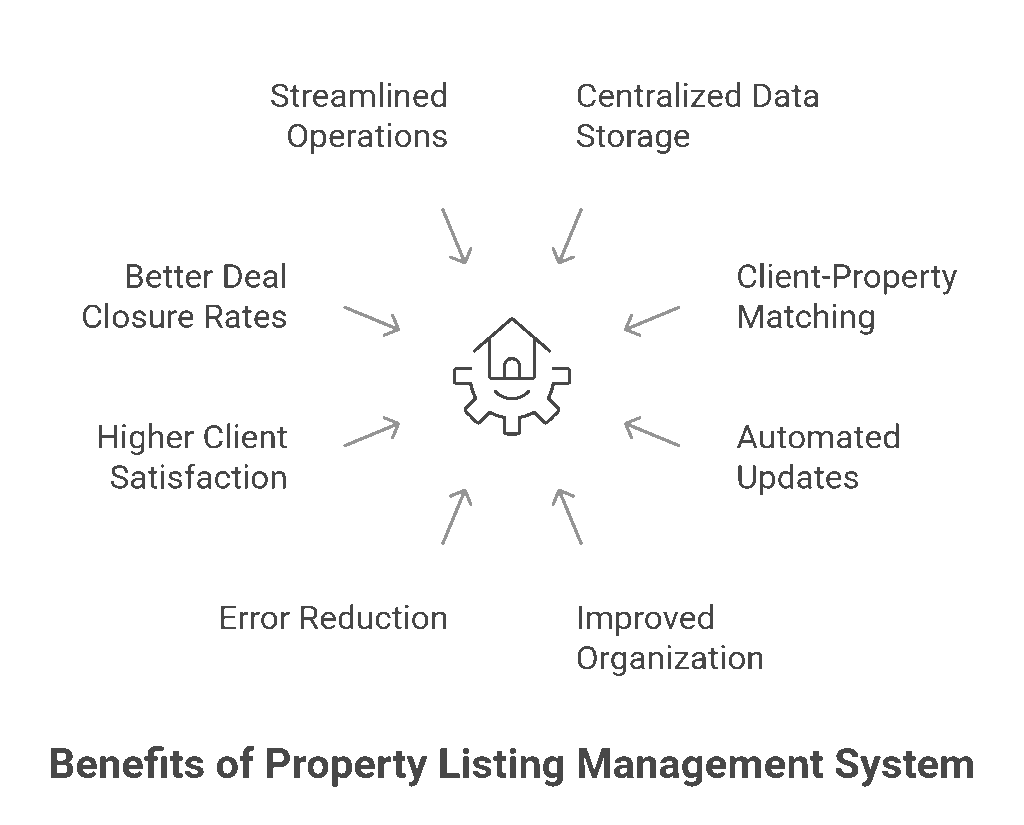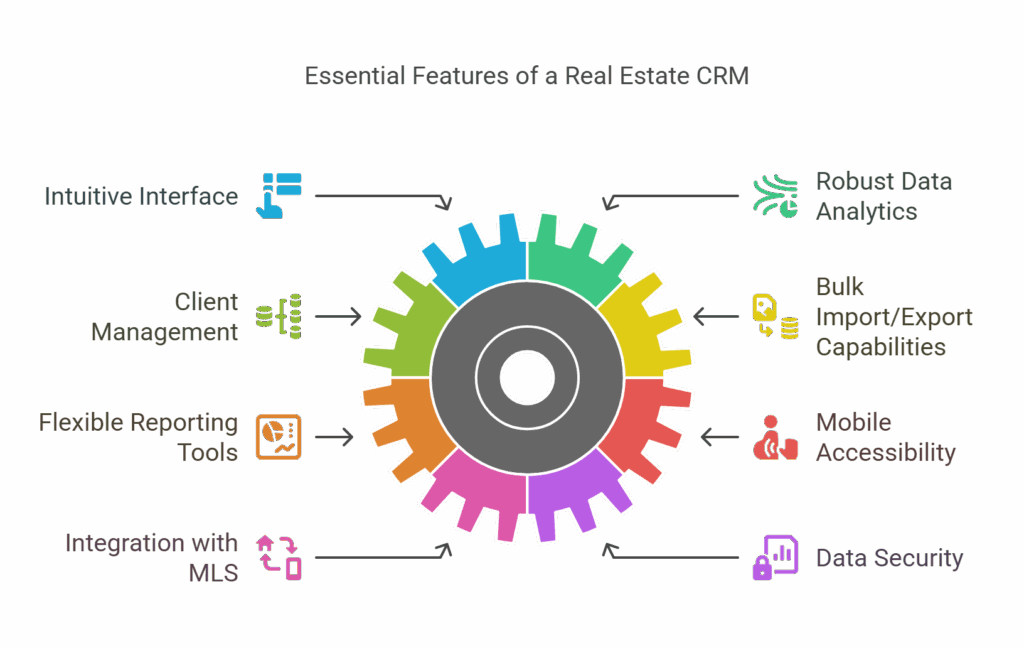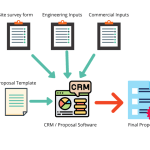Managing real estate listings goes way beyond storing property details. In a fast-paced market, you need a CRM for property listings management that helps you stay organized, respond faster, and impress your clients every step of the way.
The right tool will streamline your workflow—from listing new properties to tracking leads and sending updates—all in one place. With a solid CRM in place, you can showcase homes effectively, follow up with prospects without delay, and turn inquiries into closed deals more efficiently.
Using a CRM for property listings management also means fewer missed opportunities. It keeps all your data in check, helps you personalize client interactions, and boosts your reputation as a responsive and reliable agent. Let's explore key features, pros, and cons, and help you choose a platform that fits your business needs.
| Tool | Best For | Key Features | Free Plan? |
|---|---|---|---|
| Fuzen | Custom low-cost CRM | No-code builder, Google Sheets backend, AI tools | Yes |
| Salesforce | Enterprise brokerages | Automation, multi-channel listing sync | No |
| kvCORE | Teams & growing agencies | MLS integration, marketing automation | No |
| BoomTown | Lead-focused teams | CRM, listing alerts, IDX support | No |
| Real Geeks | Small to mid-sized teams | Built-in lead tools, drag & drop listings | No |
| Zillow Premier Agent | Zillow-focused agents | Direct listing visibility on Zillow | No |
| Propertybase | Brokerages & franchises | CRM, listing automation, marketing templates | No |
Common Challenges in Manual Property Listing Management
Manually managing property listings can be overwhelming, especially in a fast-moving real estate market. Here are some of the most common challenges agents face without a proper CRM for property listings management:
1. Data Discrepancies
Keeping information consistent across multiple platforms is tough. Manual updates often lead to errors like incorrect pricing, outdated images, or inaccurate availability, which can confuse clients and hurt your professional credibility.
2. Time-Consuming Processes
Updating listings, uploading images, and modifying details manually eats up valuable time. This leaves agents with less room for high-impact activities like networking, client meetings, and closing deals.
3. Lack of Automation
Without a CRM for property listings management, you're stuck doing repetitive tasks manually. These could include sending listing updates, matching clients with properties, or following up on leads—tasks that a CRM could automate easily.
4. Inefficient Client-Property Matching
Matching buyers or renters with suitable properties becomes a tedious process when done manually. A CRM can instantly filter listings based on a client’s preferences, saving hours of back-and-forth and improving the client experience.
5. Difficulty in Keeping Listings Updated
Managing listings across different platforms—like your website, real estate portals, and social media—without a centralized system leads to inconsistencies. Outdated listings can reduce visibility, confuse clients, and cause you to miss out on potential leads.
Benefits of Real Estate CRM for Property Listings Management
Centralized Data Management
All your listings, client data, images, and documents live in one place. You save time and reduce confusion by avoiding multiple tools or spreadsheets.
Automated Client-Property Matching
Modern CRMs can suggest properties based on a buyer’s preferences, budget, and location—instantly improving the speed and accuracy of recommendations.
Real-Time Listing Sync
CRMs can push updates across your website, email lists, and third-party portals automatically. No manual syncing required.
Improved Lead Tracking
Track every inquiry, email, and showing schedule in one system. This keeps you organized and ensures no lead falls through the cracks.
Better Client Experience
Faster response times, personalized suggestions, and accurate data help build trust and improve client satisfaction.
Key Features in a Real Estate CRM
To support efficient real estate listing management, your CRM should offer the following features
- Intuitive Interface: Easy to use, minimal training required
- Mobile Access: Access listings and contacts from anywhere
- MLS Integration: Keep listings synced with MLS in real-time
- Automated Workflows: Send updates, follow-ups, and alerts automatically
- Lead and Client Tracking: Centralized system to monitor lead status and history
- Bulk Import/Export: Add or update multiple listings at once
- Custom Reports: View analytics like lead conversions and top-performing listings
- Data Security: Ensure client and property data is securely stored
These crm features make real estate a powerful tool in managing property listings efficiently and effectively, helping you optimize your business operations.
Top CRM Platforms for Real Estate Listing Management (2025)
Several CRM options dominate the real estate market. Let's explore some of the top choices
1. Fuzen – Best for Custom, Affordable Real Estate CRMs
Fuzen is a no-code platform that lets you build your own CRM for listing management, tailored to your business. It's perfect for agents or small teams who want full control without hiring a developer.
Top Features:
- No-code builder for workflows and forms
- Google Sheets backend for easy data control
- AI automation for emails, listing filters, and client follow-ups
- Custom dashboards for property status, inquiries, and more
Pros:
- Extremely affordable (no subscription fees, only minimal hosting charges)
- Fully customizable for real estate workflows
- Great for non-technical users
Cons:
- Not for large enterprises
Best For: Solo agents, consultants, or small teams who want flexibility and control.
2. Salesforce – Best for Enterprise-Level Listing Management
Salesforce is a powerful CRM used by large real estate firms looking for advanced automation and custom solutions.
Top Features:
- Lead tracking, task automation
- Integration with marketing tools and MLS
- Custom objects and workflows for real estate use
Pros:
- Extremely robust
- Scalable for any team size
Cons:
- Expensive
- Steeper learning curve
Best For: Established agencies with large teams and complex workflows.
3. Zoho CRM – Best for Mid-Sized Teams
Zoho CRM offers powerful features at a lower cost, including automation, integration, and analytics.
Top Features:
- Workflow automation
- Email campaigns
- Custom reports and dashboards
Pros:
- Affordable pricing
- Easy to scale
Cons:
- Can feel overwhelming at first
- Some advanced features are paid
Best For: Mid-sized brokerages or realtors with growing client bases.
4. BoomTown – Best for Lead Generation + CRM
BoomTown is a full-suite real estate platform with CRM, lead gen, and website management features.
Top Features:
- Built-in IDX websites
- Smart CRM with auto alerts
- Ad campaign integration
Pros:
- Complete solution
- Excellent lead tracking
Cons:
- High pricing
- Best for U.S.-based users
Best For: Agents looking for strong marketing + listing features.
5. kvCORE – Best All-in-One Platform
kvCORE is a fully integrated real estate platform designed to manage listings, marketing, leads, and clients all in one place.
Top Features:
- MLS integration
- Automated marketing
- Lead routing and tracking
Pros:
- Great mobile app
- End-to-end automation
Cons:
- Pricey for smaller teams
Best For: Teams seeking one platform for listings, leads, and communication.
6. Propertybase – Best for Brokerages & Franchises
Propertybase is a real estate CRM with strong listing management tools built on Salesforce.
Top Features:
- MLS sync
- Lead-nurturing tools
- Website builder
Pros:
- Ideal for franchises
- Reliable MLS integration
Cons:
- Complex interface
Best For: Medium to large brokerages and franchise networks.
7. Real Geeks – Best for High-Volume Listings
Real Geeks offers lead management, IDX websites, and listing organization for teams handling a large volume of properties.
Top Features:
- Built-in CRM
- Automated follow-ups
- IDX-powered listing tools
Pros:
- Effective lead capture
- Listing updates sync easily
Cons:
- Limited design customization
Best For: Agents with high listing turnover and large client lists.
While these CRMs provide powerful functionalities, their high monthly subscription costs can be a burden for many real estate professionals. Often, these platforms include advanced features that might not be necessary for every agency, resulting in paying for capabilities that don't get utilized.
Therefore, despite their popularity, these CRMs can be less cost-effective for those seeking a tailored solution that aligns precisely with their business needs.
Building Your Customizable Real Estate CRM with Fuzen for a Low Cost
While most tools come with pre-built features, Fuzen allows you to design and build your listing management CRM with an AI app builder without coding.
You can:
- Add custom listing fields
- Automate email alerts to buyers
- Track listing stages (live, pending, sold)
- Send Google Form updates to team members
- Use AI to build features instantly
Cost: You only pay for hosting. No subscription fees. No unwanted extra features.
Conclusion
Incorporating a CRM into your property listing management strategy brings numerous benefits. It streamlines processes, improves accuracy, and enhances client satisfaction, leading to more successful transactions. Traditional CRMs, while effective, can be expensive and often include unnecessary features.
Fuzen offers a different path. With its affordable nocode platform, real estate agents can create customizable solutions that precisely fit their needs without burdening their budget. Fuzen's ease of use, scalability, and AI integrations make it an ideal choice for professionals seeking efficiency and innovation in managing listings.
Explore how modern technology, like Fuzen, can transform your real estate business operations. Embrace these advancements to gain a competitive edge and deliver exceptional service to your clients.
Fuzen's nocode platform empowers real estate agents to create their own customizable CRM for Property Listings Management without the hefty price tag, offering a streamlined, cost-effective way to stay organized and close deals faster.

Pushkar is a seasoned SaaS entrepreneur. A graduate from IIT Bombay, Pushkar has been building and scaling SaaS / micro SaaS ventures since early 2010s. When he witnesses the struggle of non technical micro SaaS entrepreneurs first hand, he decided to build Fuzen as a nocode solution to help these micro SaaS builders.




